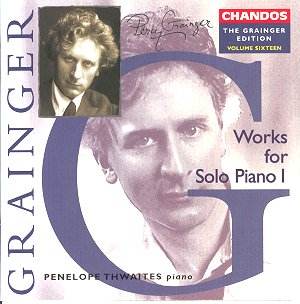Penelope Thwaites’ résumé in the accompanying
booklet leaves the reader in no doubt of her devotion to the Grainger
cause. She was Artistic Director of London's first international Grainger
Event at St Johns, Smith Square in 1998 and presented Grainger as BBC
Radio Three's Composer of the Week in 1996. In 1991, she received the
Percy Grainger Society's Medallion for services to the composer's music.
Her booklet notes to her own recital are exemplary.
There are several premiere recordings here: the two
preludes, the Gigue (from Birthday Gift) and Seven men from
all the world. In this repertoire, there are various other pianists
one should consider. Of these, the most direct comparison is Martin
Jones on Nimbus (NI1767, a five disc set). Neither pianist takes the
breath consistently away, either as a virtuoso or in their ability to
make the piano sing, although Jones shows a consistent musicianship
which is always pleasing.
Thwaites has decided to work through Grainger’s output
based on the date of genesis of a work’s idea (even if this did not
turn up on piano until much later). So, all of the pieces on this disc
date, originally at least, from the decade 1893-1903. The juvenilia
of the Bach-inspired Preludes and of the Klavierstücke,
whilst interesting and pleasant to hear will never, I think, go through
my speakers again. If the E major Klavierstück is merely
pretty, at least it avoids the meandering of the A minor. Perhaps if
I had to choose a return visit to any of the works on this disc, it
would be to the Eastern Intermezzo (originally 1898/9, set for
piano in 1922). Grainger would hear the Chinese community of his childhood
perform in Melbourne, and this probably led to this clearly affectionate
tribute.
Thwaites’ strengths are nostalgia and simplicity. So,
the Walking Tune is plainly but effectively presented, and the
Three Scotch Folksongs are imbued with integrity as well as warmth.
For Near Woodstock Town (1903 for chorus, arranged for piano
in 1951), Grainger employed more progressive harmonies: Thwaites, to
her credit, maintains the nostalgic element here.
Perhaps she could have played the showier pieces with
more abandon and let her hair down more in the Flower Waltz Paraphrase
(although she clearly enjoys the more florid passages). The final In
Dahomey (subtitled ‘Cakewalk Smasher’), suffers a similar fate.
It is always disappointing when the booklet notes are
more interesting than the music they refer to. The musicological interest
of this issue is great, and libraries should avail themselves of a copy
as a matter of course. The purely musical interest, may I suggest, is
somewhat less.
Colin Clarke

 Penelope Thwaites
(piano).
Penelope Thwaites
(piano).